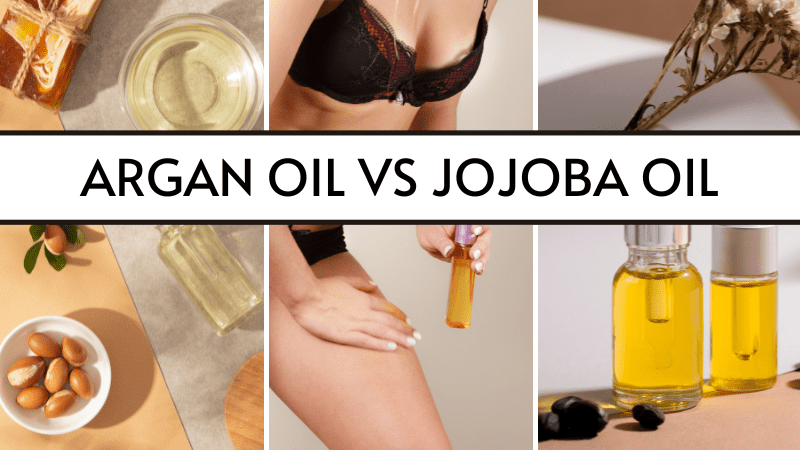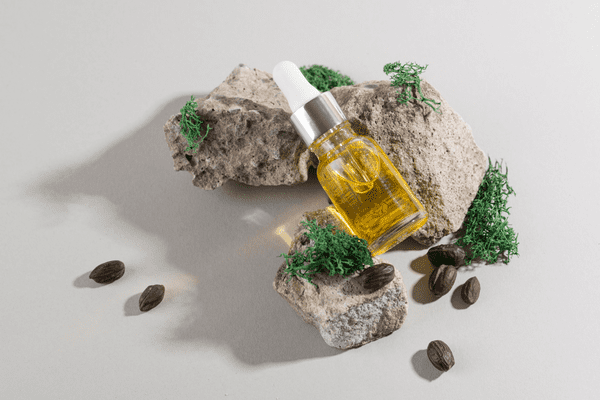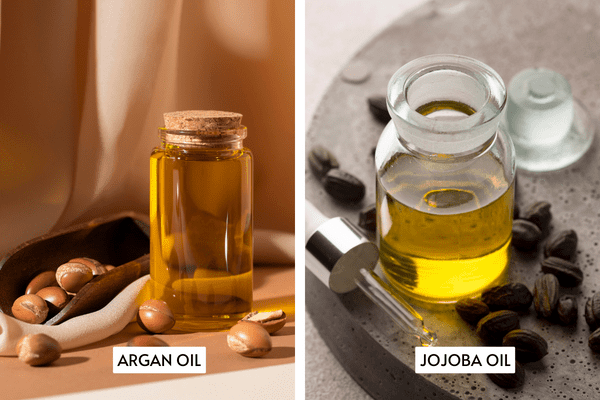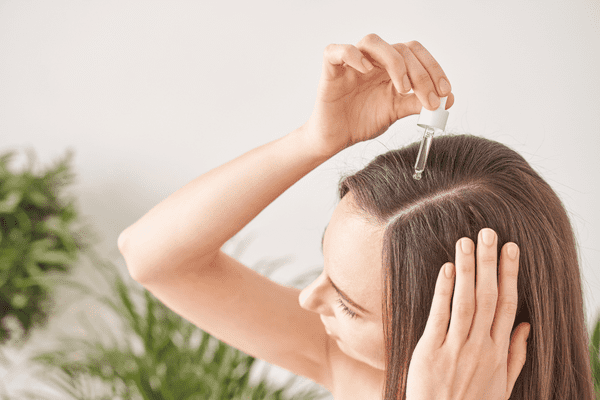Argan oil vs jojoba oil: Competition between the best!

I only recommend products I love and I think you will, too. If you click on links I provide, I may receive a little compensation. Learn more.
So, the argan oil vs jojoba oil debate has been going on for quite some time now, and it’s time to settle this once and for all!
Ever feel puzzled by the massive beauty-oil buzz? Join the club! Two names that keep popping up are jojoba and argan oils, and they are so alike it’s hard to tell the difference. But hang on, I’m here to demystify things.
In this post, I’ll decode the hype and break down which oil is the real deal for your skin and what sets them apart. So come on, let’s dive in and find out which one rules the roost!
What is argan oil?

Straight from the pressed argan tree kernels found in heavenly Morocco, this bad boy boasts more essential fatty acids, like linoleic acid and oleic acid, than our bae jojoba oil. This is why it’s more potent to keep your skin looking supple and fresh by locking in moisture all day long.
And the Vitamin E content in argan oil will also give wrinkles and fine lines the boot while fighting off free radicals that can damage your beautiful skin.
But wait, there’s more! You can also use argan oil as a hair treatment for your lovely locks and nourishing facial oil for extra dry or mature skin. This lightweight formula won’t clog pores but it’s powerful enough to tame frizz and revive dry hair. Don’t you just love a multi-tasking gem like argan oil?
Is argan oil comedogenic?
With a comedogenic rating of zero (0), argan oil is absolutely non-comedogenic, which means it is less likely that it will clog your pores or ignite breakouts.
But again, every skin type is different, so we can’t blindly follow this and use argan oil left, right, and center, okay?
What is jojoba oil?

Made from the seeds of a shrub found in Mexico and the southwestern U.S., this oil mimics our own natural sebum, making it a perfect fit for oily or combination skin types, as it helps balance and regulates sebum production.
Not only that, Jojoba oil is also awesome for those with sensitive skin, as its fatty acids soothe inflammation and combat acne-causing bacteria. Plus, its anti-fungal and antibacterial properties make it extra-ordinary for acne prone skin.
All in all, jojoba oil is an easy and maybe better replacement for harsh cleansers or chemical creams.
All in all, jojoba oil is a great choice if you’re looking for an all-natural alternative to harsh facial cleansers or acne creams.
Is jojoba oil comedogenic?
Jojoba oil has a comedogenic rating of 2, which makes it non-comedogenic, meaning it is less likely to clog pores or cause breakouts. Anything between the rating of 0-2 on a scale of 5 is considered non-comedogenic, thus, safe to use on the skin.
However, since it is barely on the edge of the scale, you should be a little cautious and always test the oil before sticking to it.
What are the differences between the two?

Both argan and jojoba oils basically do the same thing – they moisturize and keep your skin healthy. They are jam-packed with antioxidants, vitamins, and fatty acids, which make them a great moisturizer.
But here’s the sitch: argan oil is like a feather, super light and perfect for all types of skin. Meanwhile, jojoba oil is a bit heavier, so it might not be the best for folks with oily or combination skin. Either way, you’re getting a sweet dose of antioxidants, vitamins, and fatty acids.
| Basis | Argan Oil | Jojoba Oil |
|---|---|---|
| Usages | Works as an intense moisturizer for dry skin. It can help reduce wrinkles and fine lines, fade age spots and dark circles around the eyes, treat psoriasis, and even reduce acne | Also a popular moisturizer. Can help regulate sebum production in oily skin. Plus, can be used as a conditioner to treat dandruff and split ends. |
| Color | pale yellow color | Clear or light golden color |
| Cost | Expensive | Cheaper than argan oil |
| Recommended dosage | Needs to be used restrictively as it is heavier than jojoba oil | Can be used more liberally |
| Comedogenic rating | Has 0 comedogenic rating | Has 2 comedogenic rating |
| Skin suitability | More suitable for oily skin | Best suited for dry or combination skin type |
Is jojoba oil or argan oil better?
Don’t get me wrong, both oils are amazing for your skin and hair, but when it comes down to it, Jojoba oil takes the crown. Why? Well, for starters, Jojoba oil is technically not an oil, but rather a liquid wax ester that mimics our skin’s natural sebum. This means it’s less likely to clog pores and cause breakouts. (Yes, even though its comedogenic rating is higher!)
Argan oil, on the other hand, is a heavy oil that can leave a greasy residue on the skin. Jojoba oil is also rich in vitamin E, which helps to fight free radicals and promotes healthy skin, while argan oil falls short in this department.
In conclusion, Jojoba oil is the clear winner for me – it’s versatile, lightweight, and packed with skin-loving nutrients. BUT –
When choosing between argan oil vs jojoba oil for YOU, think about what kind of benefits you want for your skin type.
If you have acne or excessively oily skin, jojoba oil is your best bet. But if you have dry to combination skin, whose main concern is wrinkles and fine lines, then argan oil will be your savior.
Can you use argan oil and jojoba oil together?
You can absolutely use argan oil and jojoba oil together without any worries. Trust us, this dynamic duo has got your skin covered. When you mix these two natural oils, you’re giving your skin a double dose of nourishment and moisture.
Argan oil has anti-inflammatory properties that will calm your skin, while jojoba oil acts as a protective shield against moisture loss. The best part? These lightweight oils won’t clog your pores or cause any pesky breakouts.
Which oil is best for hair, jojoba or argan?
Honestly, argan oil has to be your number 1 when it comes to hair. This liquid gold has been used by the Moroccan Berbers for centuries to nourish and protect hair. It’s packed with antioxidants, vitamins, and fatty acids that work together to strengthen, repair, and add shine to your strands. Plus, it’s incredibly lightweight and non-greasy, so it won’t weigh down your hair or leave it looking slick.
While jojoba oil is also a great option for hair care, argan oil takes the crown for its impressive benefits and versatility. Whether you have fine, curly, or damaged hair, argan oil is a one-stop solution.
You can use it for nourishing frizzy hair shaft, treating hair loss and promoting hair growth.
One way that I like to use both of these natural oils for my hair growth and nourishment is to mix argan and jojoba oil with a bunch of carrier oils like coconut oil, sweet almond oil, olive oil, rosehip seed oil or even grapeseed oil.
How to apply Argan oil and jojoba oil

Incorporate them into your skincare
If used by itself, argan oil should be used sparingly as it is heavier in nature, preferably after cleansing and toning the skin. A few drops of argan oil can be used as a night treatment or daily moisturizer, depending on your needs and preferences.
Gently massage the oil onto your skin in a circular motion, allowing it to absorb fully. For best results, use your fingertips, as they will help to improve circulation and stimulate the skin. You can also try this new four handed massage if you want (it’s quite unique!)
If you are planning to incorporate jojoba oil into your regimen, you can apply a few drops of it to the cleansed face using circular motions. Unlike argan oil, you may find that you need to use more than just a few drops in order to get the desired effect. After applying, allow your skin to absorb the oil for about 30 minutes before rinsing off.
Use them as a hair conditioner
Not only do these oils nourish your hair, but they can also solve a ton of other hair problems like pesky dandruff, frizz, and nasty split ends. All you gotta do is grab a dropper (or use your fingers, who’s judging?) and massage a few drops of the oil into your scalp.
Give it 45 minutes to an hour to seep into hair follicles & do its thing, then rinse it off with lukewarm water and voila! You can say goodbye to bad hair days.
Build a potent body moisturizer
Mix a few drops of any of your fav oil with coconut oil, and you’ll get an unbeatable body moisturizer for you.
Argan oil vs jojoba oil: What to use for what?
- For spots and discoloration, trust me when I say argan oil is where it’s at. Thanks to its abundance of fatty acids, vitamin E, and antioxidants, it’s a game-changer for reducing the appearance of pesky blemishes.
- Need a little pick-me-up for aging skin? Say hello to argan oil once again. It’s like a magic potion that helps to smooth out wrinkles, tighten, and moisturize your skin. Combine it with jojoba oil for optimal results!
- What about redness and irritation? Honestly, I wouldn’t recommend using oils if you have eczema or rosacea. Your sensitive skin is too precious to take any risks.
- But if those acne scars are getting you down, jojoba oil can work wonders. The fatty acids and vitamin E combo is a proven hero for reducing their redness and appearance.
- Last but not least, let’s talk stretch marks. Argan oil is like a genie in a bottle for this one. Its elasticity-enhancing powers are unbeatable, making it the clear champion over jojoba oil. Trust me, your skin will thank you. Or check this post out on using argan oil for stretch marks.
Final thoughts on argan oil vs jojoba oil
Ultimately, it all comes down to what works for you. Whether you opt for argan or jojoba is entirely up to your individual preferences. Both are incredibly nourishing and beneficial for your hair, skin, and body. You really can’t go wrong no matter which you choose!
With so many different types of carrier oils available, why not try a few? Experimentation with various oils is a great way to discover what works best for your individual needs.
And remember – no matter which one you choose, using either of these natural oils regularly will give your skin (or hair!) exactly what it needs to stay healthy and glowing!
Toodles!
Related articles to argan oil vs jojoba oil
- Jojoba Oil Vs Rosehip Oil – Which Is Right For You?
- Argan Vs Rosehip Oil, Which Is Better? (You’re Not Ready!)
- How To Use Argan Oil On Stretch Marks
- How To Use Argan Oil For Eyelashes

